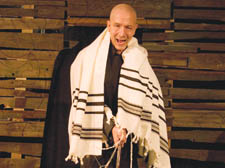|
|
 |
| |

David Meyer as Rabbi Azriel |
A tale of possession that’s haunted by a rushed plot
THE DYBBUK
King's Head Theatre
A DYBBUK, for the uninitiated in Jewish folklore, is a malicious spirit – the dislocated soul of a dead person that takes possession of the body of one who still lives.
The dybbuk in Ansky’s play of the same name – adapted for the King’s Head by Eve Leigh – is the spirit of a lovesick young man, Chonen (Edward Hogg).
Denied the hand of Leah (Hannah Steen) in marriage, Chonen turns to studying the Kaballah in the hope that he can invoke its mystical powers to bring them together.
His studies invite dark powers into his life, leading him to the point of madness and, ultimately, death and the possession of Leah’s body on the day she is to be wed to another in an arranged marriage.
The idea of a love that transcends death, the ultimate barrier, is one that only a heartless cynic could not respond to. But because so much of Chonen and Leah’s story happens before the curtain comes up, it’s hard to fully engage in their plight.
This is a shame, because it leaves the excellent climactic scenes of trial and exorcism before a rabbinical court – which contain most of the play’s dramatic tension – feeling rushed.
Though both the direction and performance in these scenes is brilliant, the audience is left in an emotional vacuum because so much of their energy has been expelled keeping up with the theological debates that dominate the first half.
It’s as if The Dybbuk can’t decide whether it’s about love or faith, with the result that neither is fully explored.
This dramatic imbalance is where the play’s major flaw lies. Leah and Chonen’s story is long and complex, but moving their plot forward is too often sidelined in favour of lengthy discussions of Jewish folklore.
It takes a universal theme and tries to develop it within a very specific frame of reference, thus alienating an audience unfamiliar with Jewish beliefs.
The result is akin to meeting Romeo and Juliet for the first time in their tragic scene in the Capulet crypt. While we might be touched by the sentiment of seeing two lovers torn apart, we don’t really know enough about them to care all that much. It’s a little like seeing a car accident – you know it’s sad, but since you don’t know the victim you chalk it up as another tragedy and simply move on.
The play is not without its strong points. Hogg’s performance in the leading role is a powerful one, an impressive display of physical acting that illustrates his pain and rage at a world that has denied him happiness.
In a more understated way, David Meyer as the Rabbi Azriel owns the second half of the play.
His is an immense presence on a small stage, and he fills the role of the troubled rabbi with a subtle dramatic force that hints very clearly at how great – with a little more thought for the audience – this play could have been.
Until February 24
020 7226 1916 |

|
 |
|
|
 |
|



